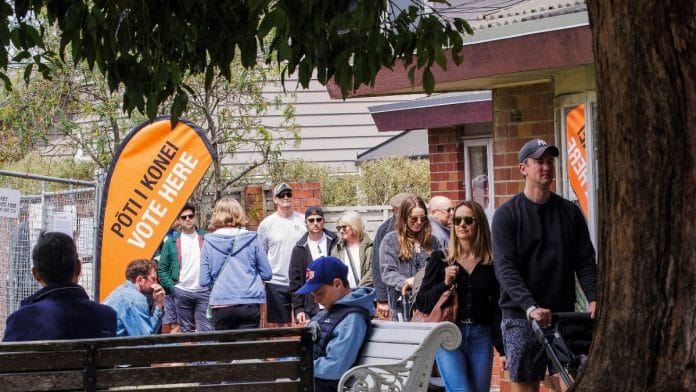New Delhi: Among the many terms analysts and global news outlets used to describe the defeat of New Zealand’s incumbent Labour Party in the preliminary election results were “bloodbath”, “bluenami” and voters’ “punishment”.
Not long after preliminary election results started pouring in Saturday, Chris Hipkins, who took over as leader of the Labour Party in January this year, conceded defeat to the National Party led by former businessman Christopher Luxon.
Ultimately, the fight came down to domestic issues — inflation, housing and crime. That Labour’s handling of the Covid-19 pandemic “backfired” also went against the ruling party, which had been in power for the last six years largely under the leadership of former prime minister Jacinda Ardern.
According to the island country’s election commission, the National Party won 38.95 percent of the vote and a projected 50 seats, up 17 since the 2020 election. Labour, on the other hand, won 26.90 percent and a projected 34 seats, down 31 from the last election.
Several Labour MPs lost seats in key strongholds including Wellington and Maori. Foreign Minister Nanaia Mahuta from the Te Pāti Maori party — a coalition partner of Labour — too lost her seat (Hauraki-Waikato) for the first time since 2008.
Elections are held in New Zealand every three years.
What a thrill to have the National MPs all together at Parliament today for the first time since the election.
We farewelled some old friends, welcomed many more, and looked forward to getting started on a busy programme to get our country back on track. pic.twitter.com/tUHFjWU5OH
— Christopher Luxon (@chrisluxonmp) October 16, 2023
Premesha Saha, a fellow with Delhi-based think tank Observer Research Foundation’s (ORF) Strategic Studies Programme that covers Oceania and Indo-Pacific affairs, told ThePrint that Labour’s domestic policies “backfired” and ultimately led to its defeat.
“The Labour Party is now paying the price for its domestic policies which clearly backfired. Pandemic restrictions under Ardern hurt New Zealand’s economy in the long-run, sending up housing prices and inflation. Also Hipkins, who lacked the clout enjoyed by Ardern, didn’t do enough to assuage people’s concerns on the economy,” Saha said.
During the pandemic, New Zealand imposed one of the harshest lockdowns to keep infections down. The restrictions, however, hurt the economy in the long-run, led to record-high inflation of 6 percent and caused housing prices to soar.
Economy aside, the Te Pāti Māori party’s insistence on abolishing prisons by 2040 wasn’t in tune with Labour’s promises to get tough on crime.
And though the National Party came out on top, it faces the uphill task of forming a coalition government which will most likely include the ACT New Zealand and New Zealand First parties. A coalition in the pacific country’s parliamentary system requires 61 seats for a majority, which means the National Party needs to secure a minimum of 11 more seats to grasp power.
Further, about half a million “special votes” are yet to be counted and will only be announced along with the final results on 3 November. In the past, these votes have swayed the election in Labour’s favour.
Also Read: Jaishankar met Canada FM in secret, Canadian diplomats still in India after ‘deadline’ — FT report
‘Curveballs’
Labour’s defeat, in Hipkin’s words, was caused by the numerous “curveballs” hurled in its direction over the last three years. These included natural disasters, the 2019 Christchurch mosque attack and the Covid-19 pandemic.
“I honestly think that the Gods rounded up curveballs to throw at us,” the 45-year-old Labour leader said in his concession speech Sunday.
Hipkins was drafted in as prime minister this January after Jacinda Ardern tendered her resignation, saying she had “nothing left in the tank”. Many viewed her exit as a blow to Labour. Her announcement, which came as a shock to many, came two months after New Zealand was rocked by violent anti-lockdown and anti-vaccination protests.
New Zealand’s parliament was put on high alert after thousands gathered in central Wellington and some even threatened to assassinate Ardern.
‘Failed to deliver’
As reported by Western news outlets, voters felt Labour failed to deliver on the “transformational change” it had promised.
Moreover, Luxon promised tax cuts for middle-income earners and a crackdown on crime while on the campaign trail, which seems to have appealed to voters.
Besides its economic policies, Labour’s environmental policies too seem to have gone against it. For instance, two farmers who spoke to The Telegraph Saturday said they were hoping for the Conservatives to win due to their “staunch stance on standing up for rural communities”.
“Labour pitted urban New Zealand against rural New Zealand, and undermined our businesses by painting us as the polluters of the planet,” Alastair Reeves, a sheep and beef farmer based in Waikato told the British daily.
To add to that, the incumbent’s green economy policies, including a proposed tax on methane from livestock, also did not bode well in rural parts of the country which is home to a little over five million people.
(Edited by Amrtansh Arora)






